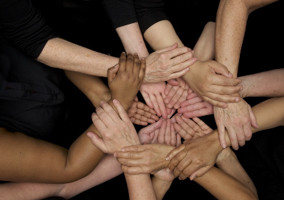It was Joe Saxton’s idea. Joe, founder director at nfpSynergy, filled the time on a flight to New York in 2016 by reading a book called The Arts Dividend by Arts Council England chief executive Darren Henley. The Arts Dividend essentially outlines the value that arts organisations bring to those that come into contact with them (and to the national economy), and Joe thought it would be constructive to have an equivalent exposition for the wider charity sector.
He felt that such a book could improve public awareness of the depth and breadth of charitable activity, repel some of the more ignorant criticisms that are levelled at charities, and give the sector a firmer footing in the wider political and social narrative. Joe approached Stephen Cook and I with the concept, and we decided to take it on.
Steve and I had worked together at Third Sector, as editor and deputy editor, from 2003 to 2006, before I absconded to Civil Society Media. He is a first-rate journalist and editor, and a stickler for detail. I jumped at the chance to work with him again. I also reckoned the project passed the “what would Dan think?” test*.
Steve and I agree with Joe that public understanding of charities is depressingly low. We are frustrated that this ignorance breeds disparagement and contributes to declining trust and confidence. We have watched with dismay in recent years as the national media’s attitude to charities has hardened, and as the prevailing political wind has blown colder.
We know that charities aren’t always good at promoting themselves, but we also know there are many reasons for this. They are too busy meeting ever-rising demand for their services, scrambling to find ever-more-elusive funding, complying with a multitude of ever-increasing laws and regulations. They are too focused on their charitable mission and playing their vital role as the canary in the mine, the value-for-money alternative to private corporations, or the sticking plaster on government failings.
But we also know that there have been scandals and failings among charities, across issues including senior pay, high-pressure fundraising, fraud and poor governance. Rather than brush these under the carpet, we have tried to analyse these and set them in the wider context. The book also addresses some of the challenges charities face over transparency and independence. Overall we aimed for the big picture, taking in charities not only as heroes or villains, but the whole wide and vital landscape in between.
So off we went. We read books, called our contacts, rummaged through magazines, scoured web pages, pored over reports, travelled to interviews and searched Hansard. Slowly but surely the pieces came together, and by early 2020 the jigsaw was all but complete.
We all know what happened next. We didn’t need our publishers to tell us that you couldn’t put out a book about charities in 2020 that didn’t mention Covid-19. So back we went: we read more newspapers, reopened our contact books, and gathered even more evidence of charities’ essential contribution to making the good society. We added stories of inspiring responses to the pandemic from all manner of charities: FareShare tripling its output virtually overnight to address rising food poverty; Royal Voluntary Service recruiting 750,000 ‘NHS Volunteer Responders’ in just four days; Hope for Tomorrow repurposing its nurse support vehicles to deliver oral chemotherapy to cancer patients who were shielding. These stories only made an already colourful picture even more vibrant, reinforcing the fact that charities are everywhere in our society but are so woven into the fabric that people don’t easily register that they’re charities.
Finally the book was finished: What Have Charities Ever Done For Us? was published by Policy Press on 13 April. We hope we have done the sector justice; if you read it, do let us know what you think. But we don’t simply want to preach to the converted. Our greatest hope is that it is read by those outside and beyond the charity sector; those that don’t already recognise and appreciate the value of charities. We all know people like that, those for whom a little education wouldn’t go amiss – suggest they read it! Because at this particular moment in time, as we head into the next stage of whatever is coming from this pandemic, charities could really use a bit more love and support from the society they serve.
*Daniel Phelan, founder and CEO of Civil Society Media, who passed away in 2015.
Related articles













